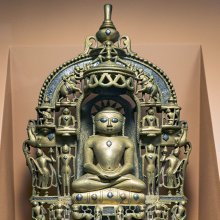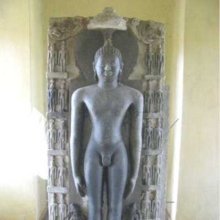Adinatha, Ādinātha, Adi-natha: 10 definitions
Introduction:
Adinatha means something in Hinduism, Sanskrit, Jainism, Prakrit, Marathi. If you want to know the exact meaning, history, etymology or English translation of this term then check out the descriptions on this page. Add your comment or reference to a book if you want to contribute to this summary article.
Images (photo gallery)
In Hinduism
Shaivism (Shaiva philosophy)
Source: Wisdom Library: ŚaivismĀdinātha (आदिनाथ) is the name of a teacher to whom the Kāpālika doctrine was revelead, mentioned in the Śābaratantra. The disciple of Ādinātha is mentioned as being Nāgārjuna. The Śābara-tantra is an early tantra of the Kāpālika sect containing important information about the evolution of the Nātha sect. It also lists the twelve original Kāpālika teachers (eg., Ādinātha). Several of these names appear in the Nātha lists of eighty-four Siddhas and nine Nāthas.

Shaiva (शैव, śaiva) or Shaivism (śaivism) represents a tradition of Hinduism worshiping Shiva as the supreme being. Closely related to Shaktism, Shaiva literature includes a range of scriptures, including Tantras, while the root of this tradition may be traced back to the ancient Vedas.
Shaktism (Shakta philosophy)
Source: Google Books: ManthanabhairavatantramĀdinātha (आदिनाथ) is the name of a deity, according to the second recension of the Yogakhaṇḍa of the Manthānabhairavatantra, a vast sprawling work that belongs to a corpus of Tantric texts concerned with the worship of the goddess Kubjikā.—Accordingly, as the Goddess said to Bhairava: “By virtue of (your intense) desire to achieve (this) in (our) friendship, I have given (you) the accomplishment of the Command. [...] Generate the fame (which is the energy called the) Nameless (Anāmā) and authority in the six sacred seats. O Siddhanātha, along with me, you are the leader in the Kula liturgy. Now you will possess knowledge that has not been seen or heard (by the senses). It is the knowledge announced in the past and brought down (to earth) by Ādinātha [i.e., ādināthāvatārita]. [...]”.

Shakta (शाक्त, śākta) or Shaktism (śāktism) represents a tradition of Hinduism where the Goddess (Devi) is revered and worshipped. Shakta literature includes a range of scriptures, including various Agamas and Tantras, although its roots may be traced back to the Vedas.
In Jainism
General definition (in Jainism)
Source: archive.org: The Jaina IconographyĀdinātha (आदिनाथ) is another name for Ṛṣabhanātha: the first of twenty-four Tīrthaṃkaras or Jinas, commonly depicted in Jaina iconography.—In the Jaina history of the Patriarchs, Ṛṣabhanātha or Vṛṣabhanātha is regarded as the founder of the religion. Details of his history are preserved in the Ādipurāṇa of the Digambaras, Kalpasūtra and Hemachandra’s Triṣaṣṭhi-Śalākāpuruṣacaritra of the Śvetāmbaras.

Jainism is an Indian religion of Dharma whose doctrine revolves around harmlessness (ahimsa) towards every living being. The two major branches (Digambara and Svetambara) of Jainism stimulate self-control (or, shramana, ‘self-reliance’) and spiritual development through a path of peace for the soul to progess to the ultimate goal.
Languages of India and abroad
Marathi-English dictionary
Source: DDSA: The Molesworth Marathi and English Dictionaryādinātha (आदिनाथ).—m The name of an ancient saint, founder of a patha or order.
Marathi is an Indo-European language having over 70 million native speakers people in (predominantly) Maharashtra India. Marathi, like many other Indo-Aryan languages, evolved from early forms of Prakrit, which itself is a subset of Sanskrit, one of the most ancient languages of the world.
Sanskrit dictionary
Source: DDSA: The practical Sanskrit-English dictionaryĀdinātha (आदिनाथ).—Name of Ādibuddha.
Derivable forms: ādināthaḥ (आदिनाथः).
Ādinātha is a Sanskrit compound consisting of the terms ādi and nātha (नाथ).
Source: Cologne Digital Sanskrit Dictionaries: Aufrecht Catalogus Catalogorum1) Ādinātha (आदिनाथ) as mentioned in Aufrecht’s Catalogus Catalogorum:—See Adhinātha, Nityanātha: Kālikānāmasahasra. P. 19. Kālīsahasranāmabhāṣya. Oudh. Ix, 20. Mantracintāmaṇi. K. 48. Mahākālasaṃhitā. Cop. 9 (Mahākālayogaśāstra). K. 48. Peters. 1, 117 (Mahākālayogaśāstre Khecarīvidyā). Haṭhayoga. B. 4, 6.
2) Ādinātha (आदिनाथ):—Trailokyadīpaka jy. Oudh. V, 12.
3) Ādinātha (आदिनाथ):—Vāgbhaṭālaṃkāraṭīkā. L. 2814.
Source: Cologne Digital Sanskrit Dictionaries: Monier-Williams Sanskrit-English Dictionary1) Ādinātha (आदिनाथ):—[=ādi-nātha] [from ādi] m. Name of Ādibuddha
2) [v.s. ...] of a Jina
3) [v.s. ...] of an author.
[Sanskrit to German]
Sanskrit, also spelled संस्कृतम् (saṃskṛtam), is an ancient language of India commonly seen as the grandmother of the Indo-European language family (even English!). Closely allied with Prakrit and Pali, Sanskrit is more exhaustive in both grammar and terms and has the most extensive collection of literature in the world, greatly surpassing its sister-languages Greek and Latin.
Kannada-English dictionary
Source: Alar: Kannada-English corpusĀdinātha (ಆದಿನಾಥ):—[noun] = ಆದಿಜಿನ [adijina].
Kannada is a Dravidian language (as opposed to the Indo-European language family) mainly spoken in the southwestern region of India.
See also (Relevant definitions)
Starts with: Adinatha kavi, Adinathamata, Adinathastava, Adinathastotra.
Ends with: Nadinatha, Yugadinatha.
Full-text (+191): Purushadya, Hathayoga, Atinatar, Trailokyadipaka, Kalisahasranamabhashya, Kavijanashevadhi, Adinatha kavi, Vagisha, Bhujabali, Mahakalayogashastre khecarividya, Malligegola, Shri, Una, Khecarividya, Unnatapura, Rishabha, Suryapura, Cakreshvari, Talanapura, Mahakalasamhita.
Relevant text
Search found 19 books and stories containing Adinatha, Ādinātha, Adi-natha, Ādi-nātha; (plurals include: Adinathas, Ādināthas, nathas, nāthas). You can also click to the full overview containing English textual excerpts. Below are direct links for the most relevant articles:
Jainism in Odisha (Orissa) (by Ashis Ranjan Sahoo)
Adinatha Temple, recently built (Khordha) < [Chapter 3: Survey of Jaina Antiquities in Odisha]
Jaina Antiquities in Hatadiha (Jajpur) < [Chapter 3: Survey of Jaina Antiquities in Odisha]
Adinatha Temple, main temple (Khordha) < [Chapter 3: Survey of Jaina Antiquities in Odisha]
The Agni Purana (by N. Gangadharan)
Trishashti Shalaka Purusha Caritra (by Helen M. Johnson)
Part 2: Stuti to Ādinātha < [Chapter III]
Part 8: Preparation of Bharata < [Chapter V]
Part 5: Story of Ārdrakakumāra < [Chapter VII - The stories of Celaṇā’s one-pillared palace]
Tiruvaymoli (Thiruvaimozhi): English translation (by S. Satyamurthi Ayyangar)
Pasuram 4.10.1 < [Section 10 - Tenth Tiruvaymoli (Onrum-tevum, ulakum)]
Introduction to Section 4.10 < [Section 10 - Tenth Tiruvaymoli (Onrum-tevum, ulakum)]
Introduction to Section 10.10 < [Section 10 - Tenth Tiruvaymoli (Muniye! nanmukane!)]
Jainism and Patanjali Yoga (Comparative Study) (by Deepak bagadia)
Part 1 - History of Jainism and Biography of Lord Mahavira < [Chapter 3 - Jain Philosophy and Practice]
Matangalila and Hastyayurveda (study) (by Chandrima Das)
Elephants in Jain Mythology < [Chapter 4]
Related products


